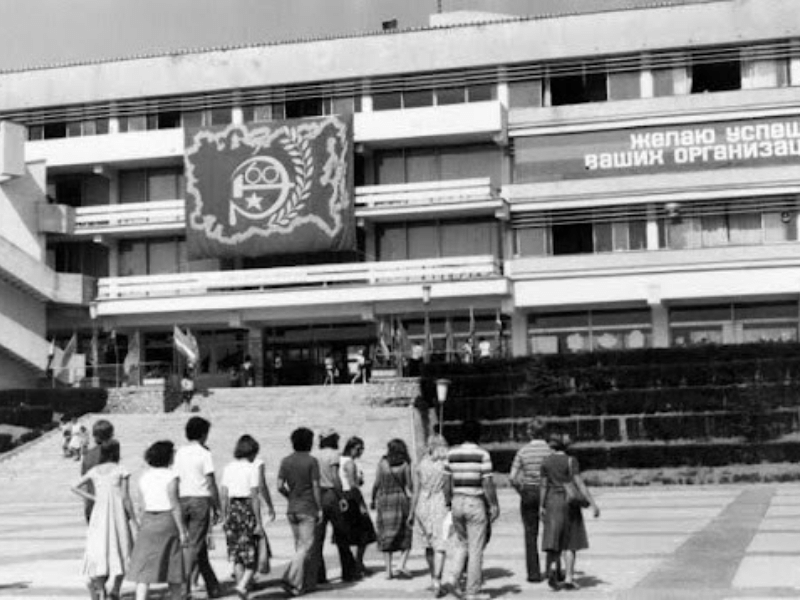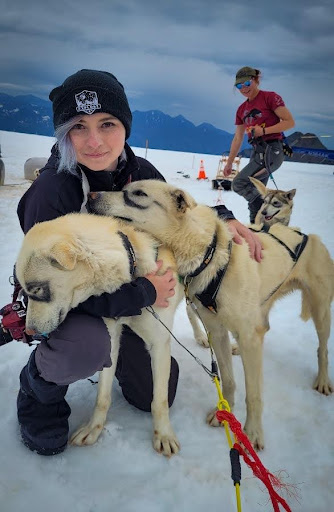The following “Lessons from Alaska” blog posts are written by Putney leader Braelei Hardt, who recounts several pivotal moments during their time leading our Middle School Alaska program and our Columbia Climate Corps program in Alaska. This is the first entry in a five-part series. We hope you enjoy their accounts of these transformative experiences!
Shaping Future Leaders with Putney Magic
In 1957, during the height of the Cold War, an audacious journey was undertaken by Putney Student Travel, which forever altered the landscape of educational summer programs. Amidst a world rife with polarization and mistrust, Putney became the first organization to take high school students to the U.S.S.R., venturing into Moscow, Leningrad, and living with Russian students on the Black Sea. This groundbreaking trip was not just about exploring unfamiliar territories; it was a bold step towards fostering social connection, empathy, and healing in a time when these values were desperately needed.

Putney students explore the U.S.S.R. during the Cold War. Leningrad, 1957. Credit: Putney Student Travel Archive
This pioneering spirit of Putney—founded on the belief that travel can be a powerful tool for learning and global understanding—has continued to evolve and resonate through the decades. Today, in an era that parallels the past with its own challenges of division and distrust, Putney’s mission remains critically relevant.
As a leader with Putney and the Columbia Climate School, I’ve had the privilege of participating in this legacy. In this role, I have strived to embody Putney’s ethos of creating meaningful, transformative experiences during my expeditions to Alaska. Each program is an opportunity to encourage young explorers to look beyond the surface, to understand the intricate connections between people, cultures, and the environment. Whether it’s navigating the fragile wilds of “Seward’s Folly” or immersing in the rich traditions of indigenous communities, the goal is to facilitate not just a journey through physical landscapes, but a journey of personal and intellectual growth.
I have seen firsthand how these experiences can ignite curiosity, empathy, and a sense of responsibility in young individuals. Through guided explorations, discussions, and reflective practices, I aim to nurture a generation of thoughtful, aware, and compassionate future leaders. Leaders who, like those Putney students who first traveled to the U.S.S.R., can bridge divides and foster understanding in a world that is navigating through times of global uncertainty and change.
In the tales that follow, you will find echoes of this philosophy; stories of young minds encountering, engaging with, and ultimately being transformed by the world in ways they never imagined. The essence of what Putney calls the “Putney Magic” lies in these very moments—when abstract concepts of empathy, connection, and global stewardship become tangible, life-changing realities for our young travelers.
Click the link to read Lessons from Alaska: A Boy and His Glacier.

About the Author
Braelei Hardt is an evolutionary biologist, conservationist, naturalist, and guide with a profound passion for wildlife and ecological education. Holding an M.S. in Biology with a focus on Acoustic Biophysics and Evolutionary Ecology, and an Honor’s B.S. in Fisheries & Wildlife Sciences, Braelei has delved deep into the realms of research and conservation. As an Assistant Naturalist at the National Wildlife Federation and a seasoned mountain guide, they combine their expertise in biological research with a commitment to outdoor education and public land use.
Braelei’s experiences range from years of guiding and field work to the publication of research on endangered species, stress physiology, and habitat acoustics. Through their work, they aim to inspire a new generation of environmentally conscious and scientifically literate individuals, fostering a deep-rooted connection between young minds and the natural world.






